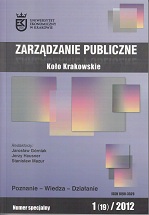Society as a coordination problem: The role of knowledge in establishing social entities
Keywords:
social process, reproduction, coordination, tie, self-awareness, intentionality, common knowledge, pluralistic ignoranceAbstract
The key thesis put forward in the paper is that it is common knowledge (in the technical meaning proposed by Robert Aumann) that forms the basis of the specifically human society and coordinates individual actions into social units (figurations), in the constant process of producing and reproducing society. Creating and maintaining common knowledge means different things in various social settings. In traditional societies and various local communities, building ‘knowledge about other peoples’ knowledge’ can be based on dense interactions and face-to-face communication. In contemporary mass societies ‘knowledge about other peoples’ knowledge’ is increasingly amassed by mass media and the symbolic middle men, who take over the initiative to synthesize and propagate content. Thus, a discrepancy appears between the local, experience-based knowledge, and the common knowledge shaped by centres (media, institutions etc.). This discrepancy, known as ‘pluralistic ignorance’, tends to weaken and dilute social ties, as more and more individuals do not recognize their experience, convictions and attitudes in the generalized ‘social opinions’.



